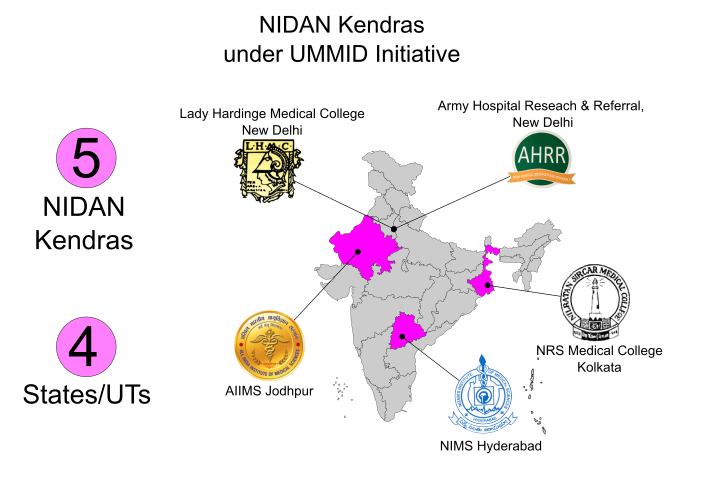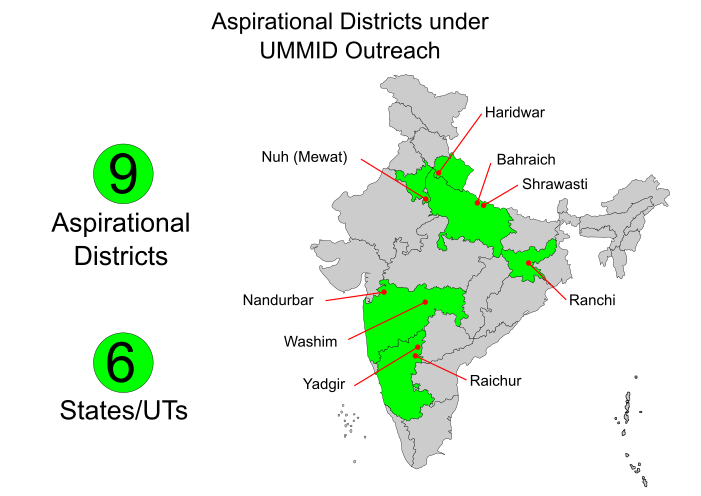Overview:
Congenital and hereditary genetic diseases are a significant health burden in India, and hence there is a need for adequate and effective genetic testing and counselling services. In India’s urban areas, congenital malformations and genetic disorders are the third most common cause of mortality in newborns. With a very large population with high birth rate, and consanguineous marriage favored in many communities, prevalence of genetic disorders is high in India. Considering these facts, the Department of Biotechnology (DBT), GoI has started the UMMID Initiative. The whole initiative is designed on the concept of ‘Prevention is better than Cure’.
The diagnostic tests for many of the genetic disorders available in India are at a relatively nascent stage. While antenatal diagnostics for a few genetic diseases are available, these are available in very few hospitals. Considering these facts, the Department, in the year 2019, launched the DBT-UMMID initiative with the objectives of establishing Genetic Diagnostic Units called National Inherited Diseases AdministratioN (NIDAN) Kendras in Government Hospitals, producing skilled clinicians in the area of Human Genetics (Biochemical Genetics, Cytogenetics, Molecular Genetics, Clinical Genetics and Comprehensive Clinical Care), and screening of pregnant women and newborn babies for diagnosis of inherited genetic diseases in aspirational districts to provide comprehensive clinical care.
Thrust Area:
Rare and Genetic Disorders
Mandate:
The DBT-UMMID Initiative is designed on the concept of “Prevention is better than cure”, and is a step towards the use of cutting edge scientific technology and molecular medicine for extending Universal Health Coverage for all. UMMID is a significant contributor to the implementation of the National Policy for Rare Diseases, 2021 (https://main.mohfw.gov.in/sites/default/files/Final%20NPRD%2C%202021.pdf). UMMID seeks to contribute to the infrastructure and human resource needs for management of genetic disorders, which account for 80% of rare disorders.
Objectives: - Establishment of genetic diagnostic centres (NIDAN Kendras) in different parts of the country to provide patient care services.
- Improve the components of medical genetics training in medical education, preparing medical doctors of the twenty-first century for the era of molecular medicine.
- Create awareness about genetic disorders amongst clinicians and the general public, so that the patients and their families get appropriate diagnosis, management & preventive services for genetic disorders.
- Spread the reach of diagnostic facilities for rare genetic disorders, pharmacogenetics, prenatal diagnosis, and population-based screening for prevention.
- Contribute data for future research on rare or common genetic disorders.
UMMID Phase-I:
Achievements:
So far, more than 60000 beneficiaries have availed antenatal screening, while more than 33000 newborns have undergone screening for various genetic and rare disorders under the UMMID Initiative.
Contacts Concerned Officer for more Information
| Programme Head | Dr. Suchita Ninawe, Scientist G |
|---|---|
| sninawe[at]dbt[dot]nic[dot]in | |
| Phone No. | 011-24363722 |
| Programme Officer | Phone No. | |
|---|---|---|
| Dr. Richi V. Mahajan, Scientist D | rv[dot]mahajan[at]dbt[dot]nic[dot]in | 011-24363029 |




















